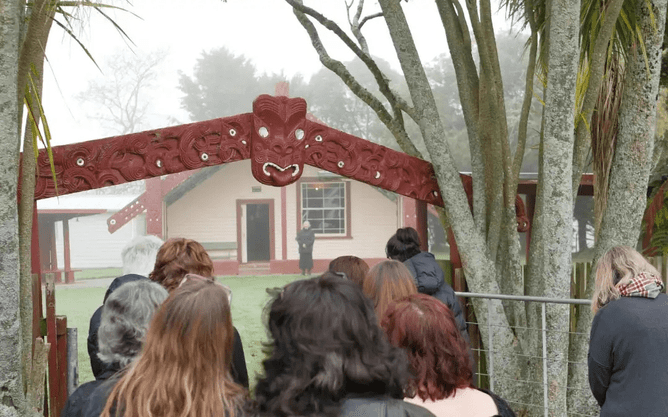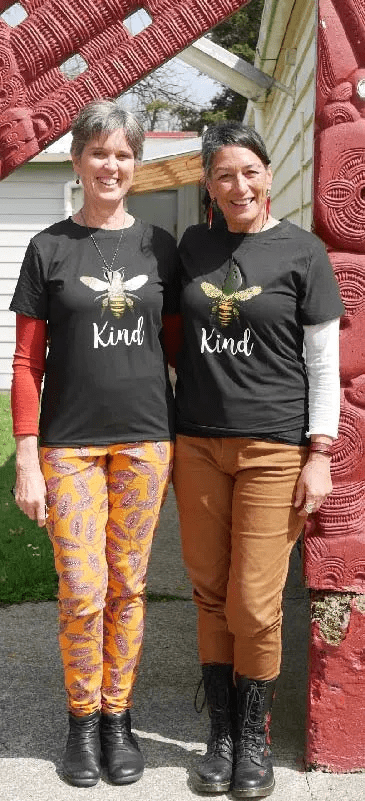Article by Louise Bobbitt – Kai Tiaki Nursing New Zealand vol 27 no 7 August 2021.10
Louise Bobbitt, RN, PGDipNurs, INC, is a clinical nurse specialist in oncology at Auckland District Health Board, and an integrative nurse coach and mindfulness-based stillness meditation teacher.
Participants in the integrative nurse coaching workshop are welcomed on to Te Kôpua Marae, on a foggy morning in Te Awamutu.
On a spring morning shrouded in fog, 12 nurses came together at Te Kôpua Marae, Te Awamutu, for the first face-to-face workshop in New Zealand on integrative nurse coaching. This was the first course outside the United States to be endorsed by the International Nurse Coach Association (INCA) and Nurse Coach Academy (NCA).
The weekend workshop was run by Anah Aikman and Heather Leong, the first two New Zealand nurses to have completed the integrative nurse coach certificate program (INCCP). Having just completed the INCCP myself at the time, to become the third integrative nurse coach (INC) in the country, I was keen to go along to support my colleagues and participate in coaching and learning in a group setting.
Integrative nurse coaching is the “emergence of a distinct nursing role that puts clients/patients at the centre and assists them in establishing health goals, creating change in lifestyle behaviors for health promotion and disease management”.1
Its roots can be traced back to Florence Nightingale, and her vision of what a healthy world might be. Nightingale was integral in the reform of sanitation and health care in England, and identified environmental determinants of health such as clean air, water, food and housing, as well as social determinants including poverty, education, family relationships and employment.
Individual change
Today, an INC is a “registered nurse who views clients/patients as integrated whole beings and honours and emphasises each person’s unique history, culture, beliefs, and story.”1 An INC recognises that a person’s health and wellbeing are influenced by their internal and external environments. They understand that individual change begins from within, before it can be manifested and sustained externally.
We were welcomed onto Te Kôpua Marae with a pôwhiri led by kaikaranga Waitiahoaho Te Ruki. Te Kôpua Marae is Anah’s spiritual home – a sacred place to connect with ancestors, recognise their contributions and uphold and embrace the enduring values, knowledge and holistic concepts of te ao Mâori, the Mâori worldview. This traditional welcome set the scene early for the creation of a peaceful space to learn and bond as a group of nurses that is rarely experienced in other learning environments.
It is important as a nurse coach to be able to understand and convey to others the concept of healing as defined in nurse coaching: “Healing is viewed as a lifelong journey of seeking integration and stability in life. Healing involves recovery, repair and renewal of the whole person, including physical health, mental, social, and spiritual health, leading to contentment with what is and freedom from struggle. Healing in this context is viewed as synchronous but not synonymous with curing”.2
As nurse coaches, we are encouraged to continuously explore our own self-development and healing, and during the first day, we had the opportunity to reflect on our own dreams and desires. As I met with clients during the practicum phase of the course, it was useful to share with them that I too was on a journey, just as they were, to improve my own health and wellbeing.
I was able to empathise with them and recognise the real struggles that can be experienced when making changes. This adds authenticity to coaching and helps the nurse move easily between the expert nurse role of knowing, being an educator and managing symptoms, to the nurse coach role of not fixing, but rather assisting the client to access their own inner wisdom. Using reflective and open questions, the nurse coach helps the client gain better insight into their lifestyle behaviours and choices. This can lead to them making sustainable change and flourishing.
We were introduced to integral lifestyle health and wellbeing (ILHWB), which is a science-based approach to health. It deals with primary prevention and underlying causality through a whole-person perspective. The INCA uses a validated integrative health and wellness assessment (IHWA). The IHWA was developed over 30 years of integrative and integral clinical nursing practice, education and research. This assessment is part of the nurse coach five-step process and covers eight components that are constantly interacting with each other.
These are: life balance/satisfaction, relationships, spiritual, mental/emotional, physical/nutrition, physical exercise and weight, environmental and health responsibility.
Although not essential for use in the coaching session, the IHWA can be a tool to help clients focus on what matters to them the most at that time, and to guide them toward where they are ready and motivated to make change.
Having spent time learning and understanding the TINC, we then moved onto the practice of nurse coaching. Nurse coaching aligns with the nursing process – the core focus is on creating sustainable change. Nurse coaches learn about and utilise change theory. This includes the transtheoretical model (TTM) of behavioural change. This model identifies motivation for change and whether the client sees change as a perceived threat or benefit. It also incorporates their perceived capacity for change. It addresses the intention to change and the process of change and explains how people change their health behaviours over time.
An understanding of the five stages of change – pre-contemplation, contemplation, preparation, action, and maintenance – is essential for the nurse coach to help a client establish goals that can be sustained.

